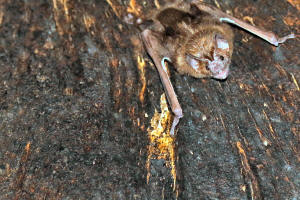Good friends and fresh blood: the social life of a vampire bat
 Send a link to a friend
Send a link to a friend
 [September 24, 2021]
By Will Dunham [September 24, 2021]
By Will Dunham
WASHINGTON (Reuters) - When one thinks of
vampire bats, friendship and cooperation may not be among the qualities
that come to mind for these blood-feasting creatures of the night. But
maybe they should.
Scientists on Thursday provided a deeper understanding of social
relationships among vampire bats, showing how those that have forged
bonds akin to "friendships" with others will rendezvous with these
buddies while foraging for a meal.
Researchers attached small devices to 50 vampire bats to track nighttime
foraging in Panama, when these flying mammals drink blood from wounds
they inflict upon cattle in pastures. The study involved female bats,
known to have stronger social relationships than males.
Among the bats were 23 wild-born individuals that had been kept in
captivity for about two years during related research into bat social
behavior. Social bonds already had been observed among some of them.
After being released back into the wild, the bats were found to often
join a "friend" during foraging, possibly coordinating the hunt.

"Each bat maintains its own network of close cooperative social bonds,"
said behavioral ecologist Gerald Carter of the Ohio State University and
the Smithsonian Tropical Research Institute, who led the research
published in the journal PLoS Biology.
Social bonds among vampire bats as they roost in trees include grooming
one another and regurgitating blood meals for hungry pals. The study
showed that the social bonds formed in roosts extended into the hunt.
"This study opens up an exciting new window into the social lives of
these animals," Carter said.
The researchers suspect that the bats, while almost never departing on
foraging forays with their "friends," link up with them during the hunt
- perhaps even recognizing one another's vocalizations - for mutual
benefit. They hypothesize the bats might exchange information about prey
location or access to an open wound for feeding.
Vampire bats, which inhabit warmer regions of Latin America and boast
wingspans of about 7 inches (18 cm), are the only mammals with a
blood-only diet. They reside in colonies ranging from tens to thousands
of individuals.
[to top of second column]
|

A vampire bat is seen roosting inside a tree in Tole, Panama, in
this photo taken in 2018 and released on September 23, 2021. Gerald
Carter/Handout via REUTERS

"People's first reaction to vampire bats is usually,
'Uh, scary.' But once you tell them about their complex social
lives, they are quite surprised that we can find such behavior that
is somewhat similar to what humans do - and which one would maybe
expect in primates - in bats," said study co-author Simon Ripperger,
a Smithsonian Tropical Research Institute post-doctoral researcher.
Ripperger called them "amazing creatures" for several reasons.
"Even besides their social lives, vampire bats are quite special:
specializing in a diet of 100% blood is already quite rare among
vertebrates," Ripperger said. "They are amazing runners, which you
wouldn't expect in a bat. They have heat sensors in their snouts
that help them find a spot to make a bite. They have a protein in
their saliva that prevents blood from coagulation, which is actually
being used in medical trials to help prevent blood clots in patients
who suffered a stroke."
The bats attack prey from the ground, using their sharp teeth to
open a wound, lapping up blood with their tongues.
Carter said there is reason to fear vampire bats because they can
transmit rabies to livestock and people.
"But I do think they are beautiful and interesting animals in their
own right," Carter added. "In this way they are a bit like grizzly
bears, sharks, rats and venomous snakes: animals that might not help
people in any way and might even endanger them, but should still be
appreciated for their own sake."

(Reporting by Will Dunham, Editing by Rosalba O'Brien)
[© 2021 Thomson Reuters. All rights
reserved.] Copyright 2021 Reuters. All rights reserved. This material may not be published,
broadcast, rewritten or redistributed.
Thompson Reuters is solely responsible for this content. |